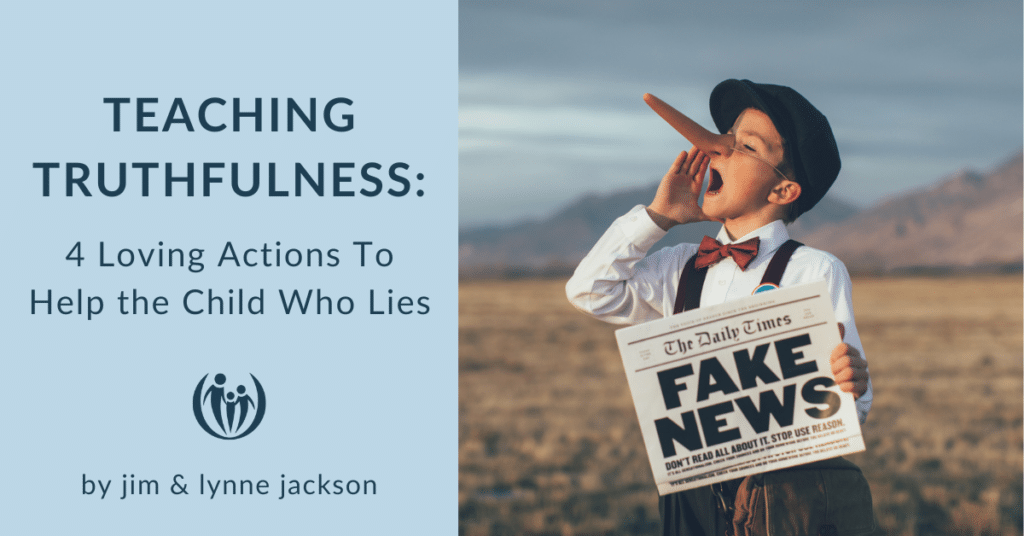
Teaching Truthfulness: 4 Loving Actions To Help the Child Who Lies

How do you teach truthfulness to your kids? Kids are bound to lie, and parents are bound to catch them. When that happens, most parents default towards demanding an immediate confession, punishing, and/or lecturing. Unfortunately, this can spiral into a contentious cat-and-mouse game, as kids become more crafty at lying and parents become more angry. It’s not really helpful toward the goal of teaching truthfulness.
So if punishing and lecturing don’t teach truthfulness, what does? In our work with parents, we have seen that treating lying with grace and placing a high value on truth-telling powerfully opens children’s hearts to the Holy Spirit’s conviction about lying and honesty. Here are four ways to make that practical:
1. Teach the value of truthfulness
Stories can be a powerful teaching tool. Researcher Victoria Talwar, Ph.D. states that “…the most compelling stories illustrate to children how to be honest even when it might be easier to lie. They can show that there are positive consequences to being honest.” For example, even though it seems counterintuitive, research tells us that reading a book about the dangers of lying (i.e., The Little Boy Who Cried Wolf) actually slightly increased kids’ frequency of lying. In contrast, a book about truth-telling and its impact (i.e., George Washington and the Cherry Tree) reduced lying by 50% in girls and 75% in boys!
Stories are great, but your story is even better. What lessons have you learned about honesty in your life? Make a point to “model out loud” (share your thought process) when you resist the temptation to exaggerate something that makes you look good or to cover up an embarrassing moment. What you model is far more helpful than confronting or punishing kids when they lie!
2. Acknowledge the gift-gone-awry in lying
If you want to build bridges of trust with a child who struggles with lying, it helps to acknowledge that they just might be using a few good “gifts gone awry” to do it… like creativity, confidence, good memory, and even a desire to keep the peace. “If I did something I shouldn’t have, my best chance of having my parent be happy with me is to tell them I didn’t do it.”
Our son Noah struggled for a little while with truth-telling when he was in late elementary school. He was definitely a “get along with everyone” kind of kid that didn’t want to disappoint us. We named that good trait of wanting connection and joy in his relationships. Then we added, “This is not the most helpful way we’ve seen you use it, however. It’s important that we keep a close, trust-based relationship. What are your ideas about that?”
One of those “gifts-gone-awry” may be cognitive skills. Talwar states, “A child who is going to lie must recognize the truth, intellectually conceive of an alternative reality, and be able to convincingly sell that new reality to someone else. Therefore, lying demands both advanced cognitive development and social skills that honesty simply doesn’t require.“ “…kids who start lying [early] at two or three…do better on other tests of academic prowess.”
And lying is more prolific than parents imagine. Talwar’s research also revealed, “In studies where children are observed in their homes, four-year-olds will lie once every two hours, while a six-year-old will lie about once every hour. Few kids are an exception. In these same studies, 96% of all kids offer up lies.”
We did a podcast on this topic!
Check out Episode 131 of our podcast, “How To Guide Your Child To Love Honesty” for an honest conversation as Stacy Bellward talks with Jim Jackson (Connected Families Co-Founder) and Chad Hayenga (Connected Families Parent Coach). You’ll receive great ideas to navigate lying that you can start using today.
3. Affirm honesty in your kids
Another vital element of teaching truthfulness is to help your child build an identity of being a truthful person. When you know your child might be tempted to lie, set them up to tell the truth. Instead of asking, “Did you brush your teeth?” say, “Let’s quickly check your toothbrush before you leave. Do you think I’ll find it wet or dry?” Then, when the child says, “It’s still dry.” You can respond by affirming the true answer. “You could have lied about that, but you didn’t. When you tell the truth like this, it helps me trust you more. Thanks! I really appreciate that.”
Parents can also help children learn to value honesty as they “catch” them telling the truth without prompting. Kids tell the truth much more often than they lie. Especially for younger kids, listen to a child tell a story about her day or ask a child his favorite food or color or vacation. When you hear the truth, you have a chance to affirm, “You’re telling the truth, aren’t you? That feels good, doesn’t it?”
An excellent opportunity to affirm truthfulness is when kids are angry and spouting off. Parents can affirm their honesty. “You are really ticked off about this! I think it would be best to talk about it when you’re calmer, but I appreciate how honest you were just now! Even if it’s hard for me to hear, your honesty is really important to me.”
This sends strong messages to your child – your honesty is more important to me than your delivery. Heart connection is more important than outward behavior.
4. Teach about God’s conviction
Lying is a valuable opportunity to help your kids learn to tune into that subtle, unsettled feeling of God-given conviction. It truly is the best “consequence” to teach your children the value of integrity. At a relaxed time, talk with your kids about that knot in their stomach they might experience when they lie or do something else that is hurtful. Help them view this as a good thing, a sign of maturity, or even a gift. It’s God’s protection of their life and relationships. The Holy Spirit guides us into truth, and that truth — including the truth about our sin — sets us free! (John 16:13, John 8:32). Share with your child an example of a time you lied or were deceitful, how you felt God’s conviction, what you did to make it right, and how you felt afterward.
We gently helped our son Noah learn to tune into that “Holy Spirit knot” in his stomach. He began to come to us (sometimes in tears), “Mom, Dad… I lied again.” This gave us a rich opportunity to affirm his tender conscience and honesty and extend forgiveness. It was the beginning of his growth to be the meticulously honest young man he is today.
See the opportunity in teaching truthfulness
If your child lies, it’s a holy opportunity to bring grace and guidance into their sin, as well as a prompt to make sure we are meticulous in modeling truthfulness. When we respond to our children this way, we create the closeness that is fertile soil for honesty. Moreover, we draw our kids toward the gracious, come-alongside role of the Holy Spirit in their lives. And what can be better than that?!
This week’s article is adapted from the appendix of our book Discipline That Connects With Your Child’s Heart. Order your copy today!
Learn more about the Framework
Want to dig deeper into Connected Families’ Parenting Framework?
Get our FREE ebook, 4 Messages Every Child Longs to Hear.




